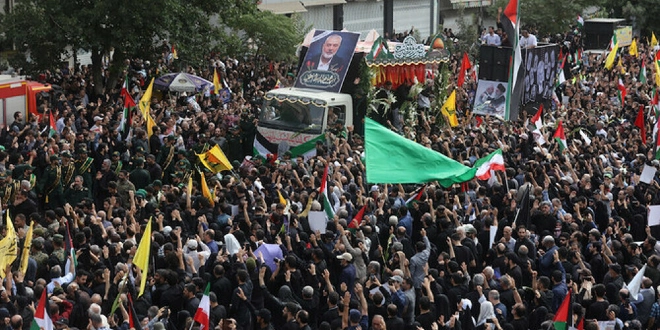Iran held funeral processions on Thursday, calling for revenge following the killing of Hamas political chief Ismail Haniyeh in Tehran, an attack blamed on Israel.
Ayatollah Ali Khamenei, Iran’s supreme leader, led prayers for Haniyeh before his burial in Qatar, threatening “harsh punishment” for his killing. Thousands gathered in Tehran’s city center, carrying posters of Haniyeh and Palestinian flags, for the ceremony at Tehran University.
Haniyeh’s death was announced by Iran’s Revolutionary Guards, stating he and his bodyguard were killed in a strike on their accommodation in Tehran early Wednesday morning. This came shortly after Israel killed top Hezbollah commander Fouad Shukur in Beirut, raising fears of a broader regional conflict amid the ongoing Israel-Hamas war in Gaza. Israel has not commented on the Tehran strike.
Iranian state TV showed Haniyeh’s and his bodyguard’s coffins, draped in Palestinian flags, at a ceremony attended by senior Iranian officials, including President Masoud Pezeshkian and IRGC chief General Hossein Salami. Haniyeh was in Tehran for Pezeshkian’s inauguration on Tuesday.
During the funeral, senior Hamas figure Khalil al-Hayya vowed that Haniyeh’s slogan, “We will not recognize Israel,” would endure and pledged to continue opposing Israel.
Iran’s parliamentary speaker, Mohammad Bagher Ghalibaf, asserted that Iran would carry out Khamenei’s order for revenge, stating, “It is our duty to respond at the right time and in the right place.” The crowds chanted “Death to Israel, Death to America.”
The caskets, adorned with a black-and-white keffiyeh pattern, were carried through streets filled with flag-waving mourners. Khamenei emphasized that seeking revenge for Haniyeh’s death was a duty as he was martyred in Iran.
Pezeshkian warned that Israel would soon face the consequences of its actions, while the international community urged de-escalation and efforts towards a Gaza ceasefire. UN Secretary-General Antonio Guterres described the strikes in Tehran and Beirut as “dangerous escalation,” stressing the need for a ceasefire and the release of hostages taken during Hamas’s October 7 attack on southern Israel.
Qatar’s Prime Minister Sheikh Mohammed bin Abdulrahman Al-Thani questioned the impact of Haniyeh’s killing on mediation efforts, saying it undermines the negotiation process.
US Secretary of State Antony Blinken called for all parties in the Middle East to “stop escalatory actions” and reiterated the importance of a ceasefire in Gaza, though White House National Security Council spokesman John Kirby acknowledged that the deaths of Haniyeh and Shukur exacerbated regional tensions.
Israel has not confirmed involvement in Haniyeh’s death but claimed responsibility for Shukur’s killing, accusing him of a rocket attack that killed 12 youths in the Golan Heights. These developments further inflame regional tensions amid the ongoing Gaza conflict, which has drawn in Iran-backed groups from Syria, Lebanon, Iraq, and Yemen.
Yemen’s Houthi rebels declared three days of mourning for Haniyeh, expressing condolences to the Palestinian people and Hamas.
The United Nations Security Council held an emergency meeting at Iran’s request to discuss the strike.
Hamas had been engaged in indirect negotiations for a truce and hostage exchange with Israel, facilitated by Egypt, Qatar, and the US. Analysts suggest Haniyeh’s death could shift dynamics within Hamas, despite the likelihood of his replacement.
Israeli Prime Minister Benjamin Netanyahu has vowed to destroy Hamas in retaliation for the October 7 attack that killed 1,197 people and led to the capture of 251 hostages, 111 of whom remain held in Gaza.
Haniyeh’s killing has raised concerns among Israelis about the prospects of a hostage deal. Israeli retaliatory actions in Gaza have resulted in at least 39,445 deaths, according to the Hamas-run territory’s health ministry.


